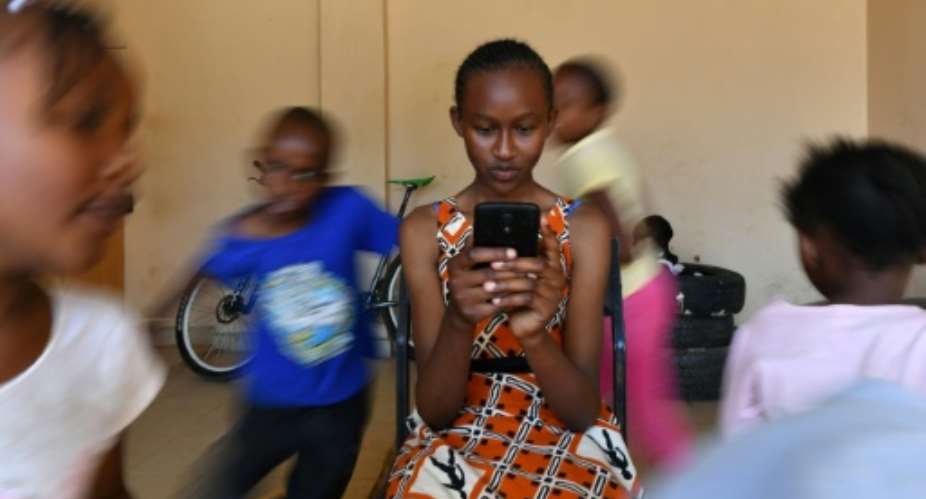At the sharp end of conflict in Syria, in a schoolchild's bag in Kenya, whether fighting deadly diseases or studying forestry, the smartphone has become ubiquitous in just over a decade.
This year, the number of users is expected to pass three billion, and AFP photographers have sampled how the phones have become a mainstay of lives around the world for people who cannot live without them.
 Finnish conservation expert Inna Salminen relies on her phone for her work in the forests. By Alessandro RAMPAZZO (AFP)
Finnish conservation expert Inna Salminen relies on her phone for her work in the forests. By Alessandro RAMPAZZO (AFP)
Take Moris Atwine, 25. The Ugandan entrepreneur helped to develop a mobile app to aid in the diagnosis of malaria, a worldwide killer, without the need for a blood sample, and transmit the result in seconds.
Qiao Xi, 21, describes her smartphone as her "boyfriend". From an all-blue studio, the Beijing-based vlogger live-streams songs, dance moves and observations about her daily life to some 600,000 followers on the Huoshan channel.
 Beijing-based Qiao Xi live-streams songs, dance moves and observations about her daily life to some 600,000 followers. By Nicolas ASFOURI (AFP)
Beijing-based Qiao Xi live-streams songs, dance moves and observations about her daily life to some 600,000 followers. By Nicolas ASFOURI (AFP)
From the frivolous to the deadly serious, Mohammed Hamroush is a member of the "White Helmets" group, which rushes to help the wounded in rebel-held parts of Syria.
 Ugandan entrepreneur Moris Atwine, 25, helped to develop a mobile app to aid in the diagnosis of malaria, a worldwide killer, without the need for a blood sample. By Sumy Sadurni (AFP)
Ugandan entrepreneur Moris Atwine, 25, helped to develop a mobile app to aid in the diagnosis of malaria, a worldwide killer, without the need for a blood sample. By Sumy Sadurni (AFP)
Hamroush's smartphone helps the volunteer to track bombardments, get to where help is needed, and allows his worried wife to know he's safe.
Inna Salminen works in far calmer conditions, surveying the forests of Finland, but knows too that her smartphone can be a lifesaver if she gets lost in a remote area.
The 27-year-old conservation expert speaks for a whole generation when she describes only having a "hazy memory" of life before smartphones.
 Mohammed Hamroush, a member of the "White Helmets" in Syria uses an app on his smartphone to track bombardments. By OMAR HAJ KADOUR (AFP)
Mohammed Hamroush, a member of the "White Helmets" in Syria uses an app on his smartphone to track bombardments. By OMAR HAJ KADOUR (AFP)
Aged 13, Imelda Mumbi has no such memory at all. The Kenyan schoolgirl uses her smartphone for fun, of course, but also to help her studies.
Imelda counts on Eneza, an interactive educational app which has about three million users worldwide, plugging her corner of Africa into a global network that has grown from nothing in a few short years.





 Critics fear Togo reforms leave little room for change in election
Critics fear Togo reforms leave little room for change in election
 Flooding: Obey weather warnings – NADMO to general public
Flooding: Obey weather warnings – NADMO to general public
 Fire in NDC over boycott of Ejisu by-election
Fire in NDC over boycott of Ejisu by-election
 NDC to outdoor Prof Jane Naana Opoku-Agyemang as running mate today
NDC to outdoor Prof Jane Naana Opoku-Agyemang as running mate today
 Ejisu: CPP seeks injunction to stop April 30 by-election
Ejisu: CPP seeks injunction to stop April 30 by-election
 Dismiss ECG, GWCL, GACL bosses over losses – United Voices for Change tells gov’...
Dismiss ECG, GWCL, GACL bosses over losses – United Voices for Change tells gov’...
 Submit 2023 audited financial statements by May – Akufo-Addo order SOEs
Submit 2023 audited financial statements by May – Akufo-Addo order SOEs
 Current power outages purely due to mismanagement – Minority
Current power outages purely due to mismanagement – Minority
 ECG hoists red flag to fight Ashanti Regional Minister over arrest of General Ma...
ECG hoists red flag to fight Ashanti Regional Minister over arrest of General Ma...
 Mahama’s 24hr economy will help stabilise the cedi; it’s the best sellable polic...
Mahama’s 24hr economy will help stabilise the cedi; it’s the best sellable polic...
